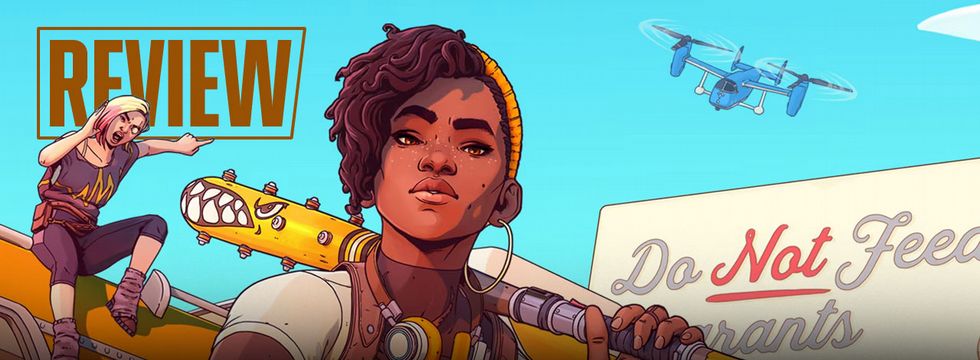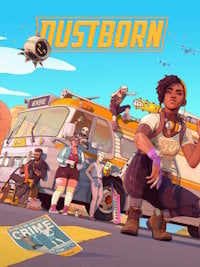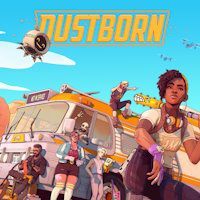Dustborn Review: Powerful Words
Your conversation choices and how you build relationships with your travel buddies play an important role in Dustborn, a game that highlights the power of words and emotions.
The review is based on the PC version. It's also relevant to PS4, XONE, PS5, XSX version(s).

Dustborn is very much an interactive novel, or rather, comic book that focuses on the relationships between characters on a road trip from Seattle to Nova Scotia. It is laden with laughter, tragedy, and even the occasional Kumbaya by a campfire—and like any good road trip story, you are sure to grow close to your travel buddies if you say the right things. Consider this a game that is meant to make you feel good and play out like an interactive poignant film.
- Stellar cast of voice actors that truly bring the game to life
- Varied gameplay elements that shake up the otherwise linear story
- A rich, poignant, and fun script that makes it a joy to sit through
- Combat never evolves past what it starts out as and feels bland
- Meaningless resources to collect near the end
However, what makes Dustborn special isn’t just its story, which is itself could be an allegory to the dangers of disinformation. No, what really makes it a powerful experience is the complexity of its characters and their thoughts, insecurities, and desires you can learn more about. Though not without its faults, Dustborn’s interesting premise, themes that focus on the power of emotions, and its colorful backdrops make for a pleasant journey that sweeps you in and makes you feel like part of the family even if that family has its share of dysfunction.
What You Say Matters
As a game, Dustborn plays like any other adventure title that lets you explore your surroundings, make certain decisions, and interact with your characters. Your choices don’t have dire “consequences” like they would in other games, but they do make an effect on how you proceed through certain chapters, and they especially affect how characters perceive you, think about you, and how they themselves grow over time. Once you complete each chapter, you can actually see a recap of your progression in a handy comic-book that summarizes your actions and shows you what percentage of players made the same choices you did.
Playing as Pax, the defacto voice of reason of the group, your choices are also never forced or come across as a pivotal moment in the game with a giant billboard that says “this choice is important,” but instead come in the form of simple conversation options you can make as you play. In fact, you really don’t know what “choice” makes a big difference on how that chapter plays out until after you see it summarized for you in the end. Everyone is ultimately playing through the same story, but how you get to that ending is up to you. This makes the game less about thinking too hard about what you should do and shifts its focus on having you simply enjoy your interactions with the characters you meet.
When you start the game, Pax and her friends are beginning a bus trip across the country to deliver a special package to Nova Scotia. Pax and most of the crew are considered to be Anomals, humans with special powers that were given to them during an “apocalypse of disinformation” that happened 30 some years ago. These powers, or Vox, are triggered by words and can alter how people perceive reality. Pax can say things to make others feel negative emotions to bully them, paralyze their thoughts, or make them believe something false. Her other friends also have voice-centric powers but their effects are unique and come in handy during parts of the game when you are exploring your surroundings.
A Bus Full of Friends
Each of your road buddies also has an insecurity or a personal dilemma they are dealing with during your trip which Pax can influence based on what she says to them or how she responds during their conversations. The interesting this is that you can also completely ignore chatting with certain characters if you wish, but don’t be surprised when they eventually notice your cold shoulder and tell you about it.
As unique as their powers are, your companions are also some of the most interesting and fun kind of people you would want to join you on a trip across the country. The cast is very diverse, and you will get to meet them yourself—but expect to ride with a caring robot that sounds like a British nanny, a plant-loving demolition expert who has to recite poetry in order to activate his healing powers, a tough yet sensitive Muslim woman with superhuman strength, and many other lovable characters. My personal favorite was Noam, an Anomal who can soothe negative emotions and brings a dry sense of humor to every conversation, oftentimes muttering some witty one-liners that you can’t help but smile at.
Everyone’s line delivery is also spot-on and makes the game feel as if you are part of a natural conversation between friends. You can’t skip any of the dialogue, however, which can be seen as a negative if you have the subtitles on and are a fast reader, but part of the reason why you can’t, I’m sure, is because the developers take pride in their cast and how good they sound. And for a game which focuses on the literal power of words, why skip what they have to say?
Road Trip Highs and Lows
Much of the game is essentially exploring a new area, walking around and interacting with the environment to discover collectibles, and “echoes” you can capture to further increase Pax’s repertoire of vocal commands she can utilize in fights (more on that in a bit.) There are some areas that act like simple puzzles you need to figure out how to solve to get past, but the game has a relaxing feel to it that fits its vibrant aesthetic. Your adventure takes you to colorful and detailed locations across the United States and you’ll make stops at campgrounds to recollect your thoughts, recap the day with your crew, and even write songs for your next show. Yes, you also get to play shows as part of your cover being a band touring the country. While the game is linear, you still have plenty of opportunity to unwind and enjoy these side mini-games and conversations.
Perhaps the game’s weakest offering is its combat sequences, which are part of the story and a necessary evil you need to get through. They’re not bad, but they’re also nothing to write home about. Pax and her party members can team up and perform some fun combo attacks using their Vox powers—a literal weaponization of words—she can throw her bat at enemies, or simply whack them until their HP is depleted. There isn’t any glitzy boss battle that takes your breath away, however, or any layered fight that gets harder over time. It’s all very bland. I also experienced a few share of bugs during the review period that made it impossible to progress through the game. These have been fixed in subsequent patches but they are worth mentioning in case they pop up in the future.
Collecting echoes and parts to upgrade your weapon also seem meaningless after you have gathered enough resources to fully maximize everything. You will realize this even before you get to the final chapter, but there still will be resources and echoes you can collect. I get it that it gives players and excuse to explore their surroundings and not rush through the game, but if collecting everything doesn’t lead to anything fulfilling, you begin to wonder why you are left with so much extra stuff in the end with nothing to spend it on.
Final Thoughts
Despite looking and playing a bit like any other adventure game where your choices can make an impact on the story’s outcome, Dustborn’s shining achievement is how it handles the relationships you craft with your fellow travelers. Each character’s unique personality gives the many conversations you will have a unique flavor, and the game’s impressive cast breathes life into every single line you hear proving how important words are in understanding one another.
While its combat system leaves much to be desired, Dustborn is filled with a variety of fun elements focused on opening up to the people around you that truly helps the game blossom into a powerful experience. Once your trip is over you will definitely miss those you got to know, but you will be thankful you got on the bus in the first place.
Dustborn was reviewed on PC with a PlayStation 5 controller.
Dustborn
Dustborn Review: Powerful Words
Your conversation choices and how you build relationships with your travel buddies play an important role in Dustborn, a game that highlights the power of words and emotions.









